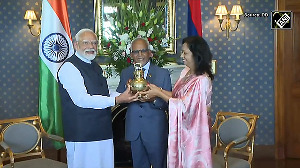Pakistan's efforts to secure an apology from the United States for a cross-border NATO air strike that killed 24 Pakistani soldiers last year has run into rough weather, with the issue emerging as the biggest hurdle in resetting ties between the two sides.
A resolution passed by a joint sitting of the two houses of Pakistan's parliament on April 12 had urged the government to seek an "unconditional apology" from the US for the attack.
US Special Envoy Marc Grossman's talks with his Pakistani interlocutors during a visit to Islamabad last week broke down on the issue of the apology.
The issue has now become a "major hurdle" in the negotiations for re-engagement between Pakistan and the US and Western diplomats put the blame squarely on Islamabad, the Dawn newspaper reported on Wednesday.
The diplomats said "serious miscalculations" were made by Pakistan in the run-up to the start of formal talks with the US.
The first round of formal Pakistan-US talks since the NATO air strike in November, which were held last week during Grossman's visit, ended "without any progress because of the American refusal to apologise and their refusal to discuss the demand by the parliament that Washington cease the drone attacks" in Pakistan's tribal belt, the Dawn reported.
During a meeting with Grossman on April 27, President Asif Ali Zardari had said the US should "help Pakistan in reaching closure" on the issue of the NATO air strikes.
He even offered to set up a mechanism to find "mutually acceptable alternatives" to US drone attacks.
Pakistan and the US have struggled to put their relationship on an even keel since the beginning of last year.
A series of crises -- including the gunning down of two men by a CIA contractor in Lahore, the unilateral US military raid that killed Osama bin Laden in the garrison town of Abbottabad and the NATO air strike -- took bilateral ties to a new low and affected counter-terrorism cooperation between the two sides.
Following the air strike, Pakistan closed NATO supply routes to Afghanistan and forces US personnel to vacate Shamsi airbase, considered a hub for CIA-operated drones.
Prime Minister Yousuf Raza Gilani ordered a parliamentary review of Pakistan-US ties, which culminated with the resolution passed by the joint session of parliament on April
12.
Since
Pakistan Army chief Gen Ashfaq Parvez Kayani's address at a military function on Monday reflected the tensions between the two sides.
Kayani said the unilateral US raid against bin Laden, the NATO air strike and a "a campaign of mistrust" by "some foreign elements" had forced Pakistan to review its "relations with others".
He added: "We think that others will have to keep in mind our sovereignty, pride and honour."
However, the Dawn quoted its sources as saying that the US had agreed at one point to offer an apology for the NATO attack.
A US delegation had conveyed Washington's readiness to tender an apology during a meeting between Foreign Minister Hina Rabbani Khar and Secretary of State Hilary Clinton in London in February.
According to the plan, Clinton was to make an apology in a statement during her interaction with the media, and this was to be followed by US Joint Chiefs of Staff Chairman Gen Martin Dempsey's call to Gen Kayani.
The daily quoted Western diplomatic sources as saying that the Pakistan Army was ready to accept the apology at that stage while President Zardari and Finance Minister Abdul Hafeez Sheikh were very keen to get the relationship back on track.
However, Pakistan subsequently told the US to wait till the completion of its parliamentary review of the bilateral relationship.
The report said this was a "serious miscalculation" as the Americans now were "no longer in the mood" to offer an apology.
"The Pakistanis are being told by the Obama administration that it is now too late for an apology," the report added.
Terrorist attacks in Kabul on April 15, which were linked to the Haqqani network, have forced a rethink in the US on the apology, media reports have said.
With the US administration now preparing for elections, experts believe the chances of an American apology are slim as Obama would not like to be seen as being soft towards a difficult ally like Pakistan.









 © 2025
© 2025